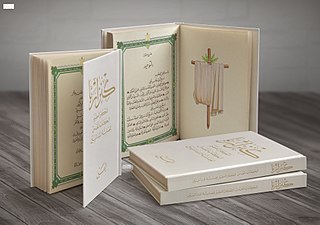
The Ginza Rabba, Ginza Rba, or Sidra Rabba, and formerly the Codex Nasaraeus, is the longest and the most important holy scripture of Mandaeism.

Tehom is a Northwest Semitic and Biblical Hebrew word meaning "the deep” or “abyss”. It is used to describe the primeval ocean and the post-creation waters of the earth. It is a cognate of the Akkadian words tiāmtum and tâmtum as well as Ugaritic t-h-m which have similar meanings. According to a theological dictionary, tehom derives from a Semitic root which denoted the sea as a non-personified entity with mythological import.
An uthra or ʿutra is a "divine messenger of the light" in Mandaeism. Charles G. Häberl and James F. McGrath translate it as "excellency". Jorunn Jacobsen Buckley defines them as "Lightworld beings, called 'utras ." Aldihisi (2008) compares them to the yazata of Zoroastrianism. According to E. S. Drower, "an 'uthra is an ethereal being, a spirit of light and Life."
The Right Ginza is one of the two parts of the Ginza Rabba, the longest and the most important holy scripture of Mandaeism. The other part of the Ginza Rabba is the Left Ginza.
Mandaean cosmology is the Gnostic conception of the universe in the religion of Mandaeism.
In Mandaeism, Yushamin and also known as the 'Second Life', is the primal uthra and a subservient emanation who was created by the Mandaean God 'The Great Life', hence beginning the creation of the material world. Yushamin is the father of Abatur. Jorunn J. Buckley identifies Yushamin as "both a Lightworld utra beyond reproach and the prototype of a priest who has made mistakes in ritual."
In Mandaeism, Hayyi Rabbi, 'The Great Living God', is the supreme God from which all things emanate.
In Mandaeism, Hibil or Hibil Ziwa is an uthra from the World of Light. Hibil is considered to be the Mandaean equivalent of Abel.
In Mandaeism, the World of Darkness is the underworld located below Tibil (Earth). It is ruled by its king Ur the Leviathan and its queen Ruha, mother of the seven planets and twelve constellations.
In Mandaeism, Qin is the mother of Ruha and Zahreil, and grandmother of Ur in the World of Darkness or underworld. In Mandaean texts, she is frequently mentioned as the "queen of darkness." One of her epithets is Sumqaq, which also refers to a well of polluted water in the World of Darkness. Her husband is the demon Anathan.
In Mandaeism, Adathan and Yadathan are a pair of uthras who stand at the Gate of Life in the World of Light, praising and worshipping Hayyi Rabbi. In the Ginza Rabba and Qulasta, they are always mentioned together. Book 14 of the Right Ginza mentions Adathan and Yadathan as the guardians of the "first river".
In Mandaeism, Shilmai or Shalmai (Šalmai) is an uthra who serves as one of the two guardian spirits of Piriawis, the heavenly yardna (river) in the World of Light. In the Ginza Rabba and Qulasta, he is usually mentioned together with Nidbai.
In Mandaeism, Nidbai is an uthra who serves as one of the two guardian spirits of Piriawis, the heavenly yardna (river) in the World of Light. In the Ginza Rabba and Qulasta, he is usually mentioned together with Shilmai.
In Mandaean cosmology, the Sea of Suf is a primordial sea in the World of Darkness. It is analogous to Tehom in the Book of Genesis. It is a great sea that the soul has to pass in the first steps of ascending, and is also considered to be the limit of worldly desire.

In Mandaean cosmology, Hiṭfun or Hiṭfon (Hiṭpon) is a great dividing river separating the World of Darkness from the World of Light. It is mentioned in Hymn 25 of the third book of the Left Ginza. The river of Hiṭfun is analogous to the river Styx in Greek mythology and Hubur in Mesopotamian mythology.
In Mandaean cosmology, Piriawis, also known as the Yardna Rabba, is the sacred life-giving river (yardna) of the World of Light. It is the heavenly counterpart of rivers on Earth (Tibil), which are considered by Mandaeans to be manifestations of the heavenly Piriawis.
In Mandaeism, Yawar Ziwa is an uthra from the World of Light. He is the personification of light.
In Mandaeism, Ṣaureil, also spelled Ṣauriel or Ṣaurʿil, is the angel of death. Ṣaureil features prominently in Book 1 of the Left Ginza as the angel who announces the message of death to Adam and Shitil (Seth).
In Mandaeism, Anathan or Anatan is a demon in the World of Darkness or underworld. He is the husband of Qin, a demoness who is the mother of Ruha and Zahreil. Hibil Ziwa encounters Anathan during his descent to the World of Darkness in Chapter 1 of Book 5 in the Right Ginza. In the aforementioned chapter, Anathan is described as "the warrior of darkness" and also as a "warlike giant." Together with Qin, the couple is described as the "giants of darkness".
In Mandaeism, Yufin-Yufafin or Yupin-Yupapin is an uthra in the World of Light. In the Ginza Rabba, Yufin-Yufafin is mentioned in Books 3 and 5.4 of the Right Ginza and Book 1 of the Left Ginza, whereas "Yufin-Uthra" is mentioned in Book 4 of the Right Ginza. He is also mentioned in many Qulasta prayers, including prayers 5, 9, 22, 28, 46, 77, 105, and 171, in which he is often mentioned along with uthras such as Sam Mana Smira and Nbaṭ.




